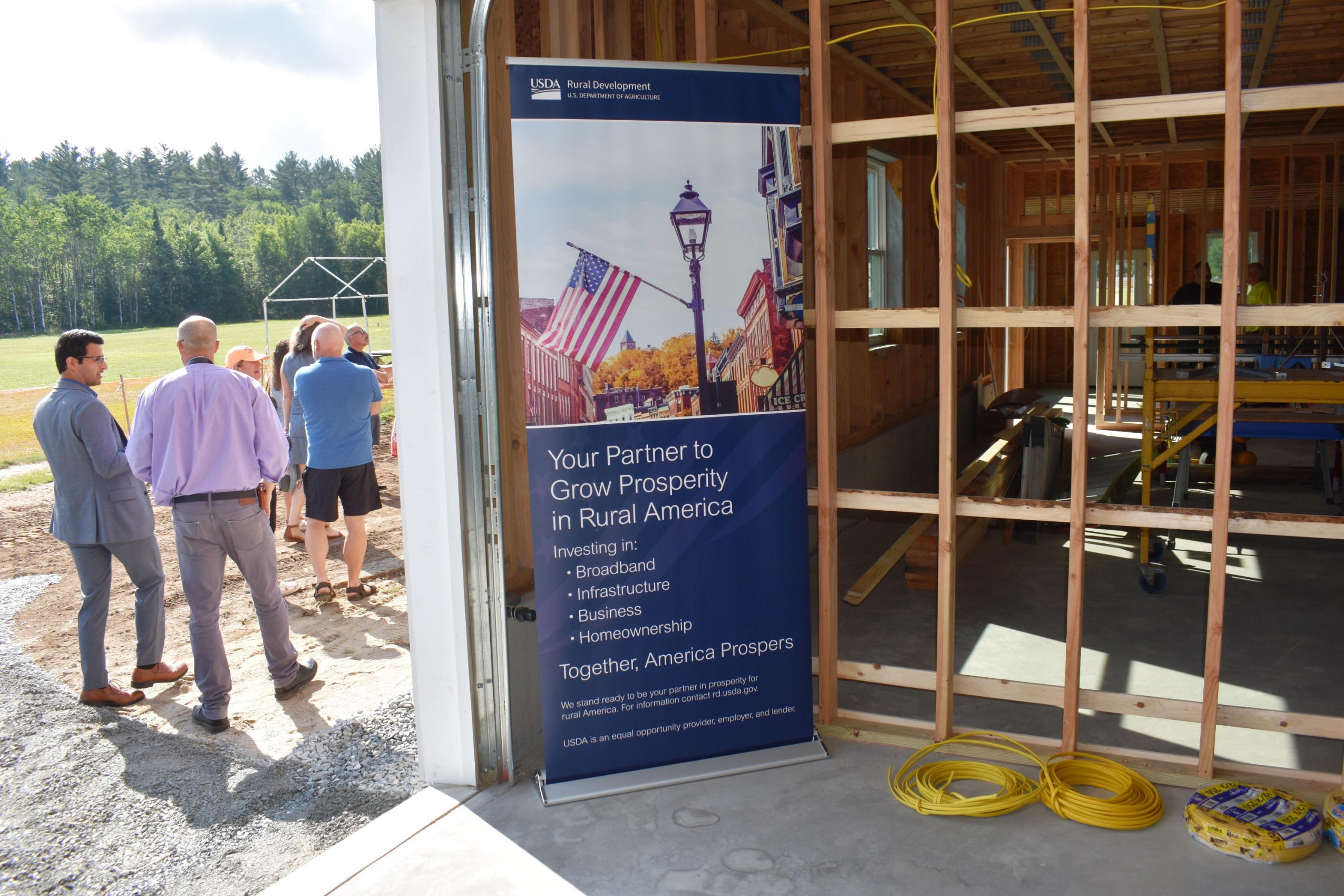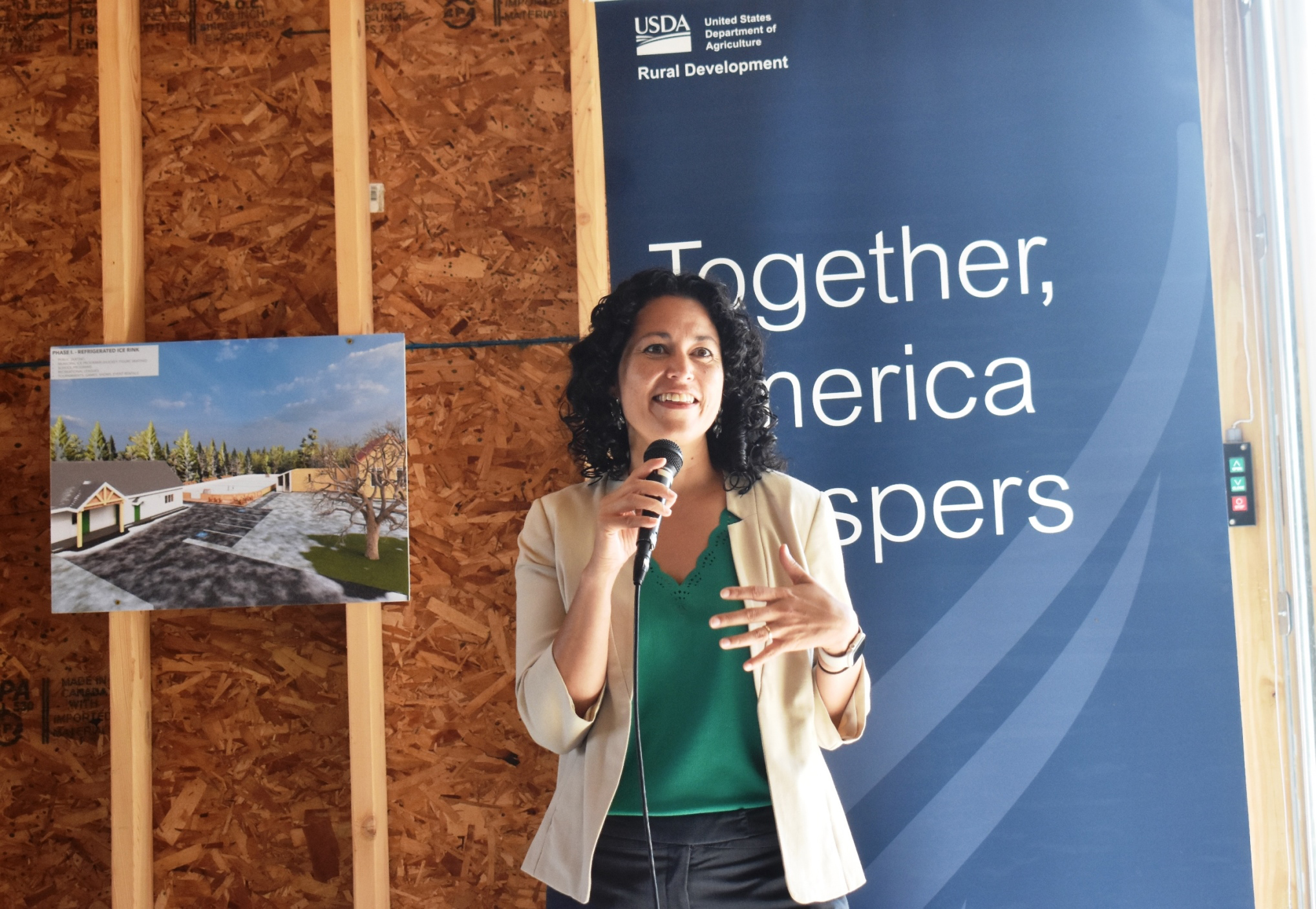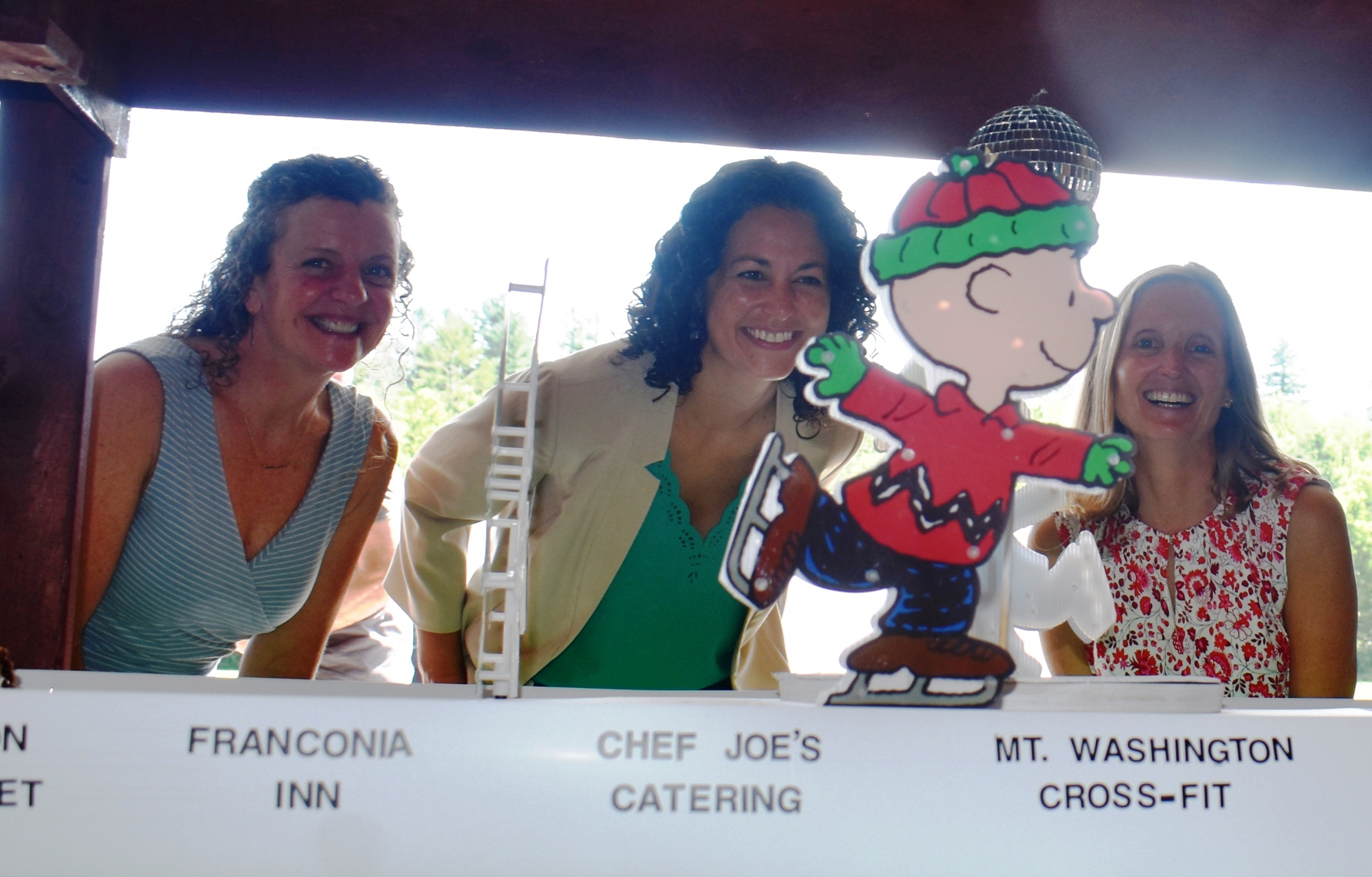Franconia Rink project secures $475,000 in federal funding for year-round attraction
Seven years ago, on an unseasonably warm February day, Jennifer Opalinski and her family were ice skating at the Boston Common Frog Pond when she had an epiphany on how to possibly address a winter-recreation issue in her hometown.
Like many North Country communities, Franconia has an outdoor ice rink, which is on Main Street near the town hall and the Abbie Greenleaf Library. The rink is annually brought to life by flooding it with water and hoping that Mother Nature will follow up with the requisite freezing temperatures.
Increasingly, however, that freezing has not happened on a recurring, predictable basis and, earlier this year, Opalinski and her husband, John, formed the nonprofit Franconia Rink Project.
On July 18, the Northern Border Regional Commission and the U.S. Department of Agriculture Rural Development announced that the Franconia Rink Project had received a $475,000 grant to support the construction of “a year-round recreation facility for key activities like an outdoor refrigerated ice rink and pickleball and basketball courts.”
The project, the agencies explained, “will diversify outdoor activity options, attract tourists year-round to the town center, and provide a recreational resource for the local community.”
The rink is still in the design stage, Opalinski said after the award announcement, and it will cost $1 million in total. The next phases may include the installation of a roof over the rink and a solar array to power the venue.
As she said earlier in her remarks thanking the NBRC and USDA Rural Aid, Opalinski stressed that the goal of the Franconia Rink Project is to create an amenity that offers multiple recreational opportunities and that comes at no cost to the town of Franconia.
An educator, Opalinski and her spouse own the Dutch Treat Restaurant in Franconia Village, which is a short distance west of the existing/proposed rink. The restaurant, which has been a staple of the area for 70 years and run by the Opalinski family for the last 50, was featured in an episode of the Restaurant Impossible reality TV show in April 2023.
“This dream” — to bring a refrigerated rink to life in Franconia — “started in 2017 at the Frog Pond on the Boston Common” when temperatures were in the 50s, said Opalinski, and the realization that outdoor skating was possible, even in adverse conditions, if the rink was cooled from below.
The current Franconia rink is 100% dependent on cold weather, she said, adding that last winter it was open for only 10 days of skating, when, ideally, it should be open for 90, beginning after Thanksgiving.
Chris Saunders, federal co-chair of the NBRC, a federal-state partnership whose mission is to “catalyze community vitality and economic prosperity in Maine, New Hampshire, New York and Vermont through flexible funding and strategic support,” said the grant to the Franconia Rink Project and other grants totaling $1.9 million, help make life in rural communities more attractive to residents and visitors.
Xochitl Torres Small, the deputy secretary of agriculture, echoed that point at the July 18 announcement event, and praised President Joe Biden for knowing the grant recipients represent “something worth investing in.”
She said she was “deeply proud” to be part of the award announcements, adding that Biden is committed to supporting the work of the USDA and its partners.

Xochitl Torres Small, the deputy secretary of agriculture, makes remarks on July 18 in Franconia after the Northern Border Regional Commission and the U.S. Department of Agriculture Rural Development announced several grants, including for a proposed skating rink in Franconia. (Photo by John Koziol)

Charlie Brown skates July 18 on a motorized model of the outdoor ice rink in Franconia that has been proposed by the Franconia Rink Project. From left: Janel Lawton, director of the NH Department of Business and Economic Affairs’ office of Outdoor Recreation Industry Development; Xochitl Torres Small, deputy secretary of agriculture; and Jennifer Opalinski of the Franconia Rink Project. (Photo by John Koziol)

The Franconia Soaring Association’s under-construction headquarters was the scene July 18 of the announcements of grants by the Northern Border Regional Commission and the U.S. Department of Agriculture Rural Development. (Photo by John Koziol)
Asked by a reporter about what might happen if Biden is not reelected, and that a government-reduction initiative known as Project 2025 could potentially come into play under Donald Trump, Torres Small replied that there have been “historic” levels of investment in USDA programs by Biden. (Biden has since dropped out of contention for reelection, with Vice President Kamala Harris the likely Democratic nominee for president.)
Saunders agreed that Biden has supported USDA and its partners with “historic levels of funding,” but unlike Torres Small, who, according to a staffer, is limited in making political pronouncements, he freely opined on what a second Trump administration might mean for the NBRC.
Without naming Trump, Saunders said “the last president proposed eliminating my agency,” but was stopped by pushback from lawmakers in the states served by NBRC.
After her nonprofit was named a NBRC/USDA Rural Development grant recipient, Jennifer Opalinski said it was her group’s goal to present Franconia “not burden but a joy” in the form of a proposed ice rink, which could come with a dedicated capital fund for its maintenance.
Addressing rink supporters, she told them, “We love you. We thank you. We look forward to skating with you.”
Jody Fried, the executive director of Catamount Film & Arts in St. Johnsbury, Vermont, which also received a $475,000 grant on July 18 from NBRC/USDA Rural Development, said his organization long ago had decided to do “place-based economics” by bringing the show to communities in Vermont’s Northeast Kingdom and the Upper Connecticut River Valley of New Hampshire.
He noted that one of Catamount’s portable stages is frequently used to support events in Littleton and that one was used at Franconia’s Old Home Day on July 13.
This year, Fried continued, Catamount’s two portable stages will be used at 72 events — all of them free to the public, in Vermont and New Hampshire — that are expected to draw 50,000 spectators.
The NBRC/USDA Rural Development said Catamount will use its grant money to renovate and revitalize its property “to include roofing, structural, HVAC and energy efficiency improvements.”
Other grants announced July 18 will go to the University of Maine System-Farmington, which received $475,000 to expand its Outdoor Recreation Business Administration program; to the Lake Champlain-Lake George Regional Planning Board, $250,000, to “assess the availability of cell service and conduct an indepth analysis of deployable technology in the Adirondacks; and to the Hudson Valley Community Foundation, $225,000, to develop a Mechatronics Education and Training lab.
The rink’s goal is to create an amenity that offers multiple recreational opportunities at no cost to the town.